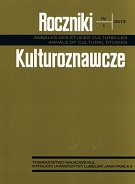Z dziejów kultury naukowej - koncepcja nauki Jeana le Rond d'Alemberta
From the History of the Culture of Science: Jean le Rond d'Alembert's Conception of Science
Author(s): Stanisław JaneczekSubject(s): Cultural Essay, Political Essay, Societal Essay
Published by: Towarzystwo Naukowe KUL & Katolicki Uniwersytet Lubelski Jana Pawła II
Keywords: Enlightenment; history of science; Jean le Rond d’Alembert
Summary/Abstract: The article discusses d’Alembert’s conception of science as a manifestation of the Enlightenment culture of science. Albeit the spirit of empiricism, typical of the Enlightenment culture, is indeed dominant in it, also signs of the lasting tradition of the Cartesian rationalism can be seen, along The article discusses d’Alembert’s conception of science as a manifestation of the Enlightenment culture of science. Albeit the spirit of empiricism, typical of the Enlightenment culture, is indeed dominant in it, also signs of the lasting tradition of the Cartesian rationalism can be seen, along with the vision of unification of science understood in the modern way with philosophy, which even accounts for the traces of speculative thinking in physics. Also the effect of the spirit of more geometrico in the form of raison physico-mathématique may be perceived, that requires treating mathematics as a model of unfailing cognition, its systemic perspective, as well as linguistic precision. This, however, does not rule out legitimacy of the use of methods of the kind of cognition that is only probable, including making use of hypotheses. A specific manifestation of the unification of empiricism and rationalism in d’Alembert’s conception of science is also the legitimization of cognition that has an instinctive character, revealed in the Enlightenment owing not only to the Scottish common sense philosophy, but also to the influence of the Cartesian spirit in France of that time, from the perspective of C. Buffer SJ, who was as much an empiricist as a rationalist. An expression of a harmonious combination of these traditions is ultimately a unifying classification of sciences, in which d’Alembert legitimizes not only natural and social sciences, but also elements belonging to classical philosophy (modern Christian Aristotelianism) with references to the world view, like the ones undertaken against the background of the rise of agnosticism that was forced both by the ideal of certain knowledge and by the conception of the nature of science understood in the utilitarian way, of its origin and function. Hence, ultimately connecting d’Alembert’s conception of science with the theory of science characteristic of positivism that sometimes appears in the literature of the subject is illegitimate.
Journal: Roczniki Kulturoznawcze
- Issue Year: 4/2013
- Issue No: 1
- Page Range: 59-92
- Page Count: 34
- Language: Polish

